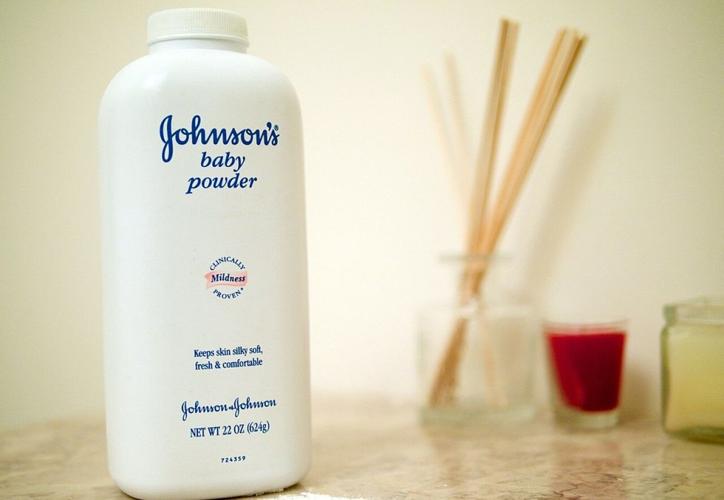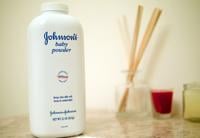
Johnson & Johnson Baby Powder no longer contains talc powder.
LOS ANGELES - A Los Angeles County jury has ordered pharmaceutical and personal care product maker Johnson & Johnson to pay $966 million to the family of a woman who claim the woman contracted a deadly cancer from trace amounts of asbestos allegedly contained in talc used at the time in baby powder.
The verdict was rendered on Oct. 7 in L.A. County Superior Court in favor of the family of Mae Moore, who died in 2021 at the age of 88 of the cancer known as mesothelioma.
In the verdict, the jury awarded Moore's family $16 million in actual damages, but tacked on $950 million in so-called punitive damages, or a payout ordered as a way of punishing a defendant for their alleged misconduct and making an example of them.
Moore's family's lawsuit was one of thousands lodged against Johnson & Johnson in recent years, all claiming that the plaintiffs or their family members were exposed to asbestos within talc allegedly contained within the baby powder manufactured and sold for decades by Johnson & Johnson.
The lawsuits largely followed the publication of a study in 2019 by Dr. Jacqueline Moline, of Northwell Health. That study claimed exposure to talcum powder alone could cause mesothelioma.
In that study, Moline claimed 33 cancer patients had no exposure to asbestos other than talcum powder.
However, Johnson & Johnson has in turn sued Moline, claiming her study contained falsehoods known to Moline. Specifically, J&J has asserted Moline knew more than half of the subjects of her study had been exposed to asbestos through other products, or had at least claimed such exposure in legal actions filed against other manufacturers alleging their products had caused them to contract mesothelioma.
J&J has called Moline's study "junk science."
Nonetheless, litigation has continued against J&J in courts in California and elsewhere in the U.S. over claims their baby powder products had allegedly caused mesothelioma.
J&J no longer includes talc in its baby powder products, having transitioned to a cornstarch-based product.
In a statement following the verdict, J&J's Worldwide Vice President of Litigation Erik Haas said the company would immediately appeal the verdict, which he called "egregious and unconstitutional."
Haas noted the verdict was "directly at odds - in result and amount - with the vast majority of other talc cases wherein the Company has prevailed, including the defense verdict last week against the same plaintiff law firm that brought this baseless action."
Haas pointed to a decision in a South Carolina court, in which a jury "wholly rejected the same plaintiff lawyers' talc claims."
In both cases, Haas said, "the plaintiff lawyers ... based their arguments on 'junk science' that never should have been presented to the jury, as it is refuted by decades of studies demonstrating Johnson's Baby Powder is safe, does not contain asbestos and does not cause cancer."
"The plaintiff lawyers' business model is to roll the dice in search of jackpot verdicts, fueled by litigation-funded junk science, without regard to the fact that most claimants recover nothing in the tort system," Haas said.
J&J has won every appeal to date concerning mesothelioma cases.
He said J&J is "confident" the verdict in the Moore case will be reversed on appeal, "for the same reasons as virtually all the other plaintiff verdicts rendered by juries similarly misled by the false narratives fed by experts on the plaintiff's payroll."
The punitive damages, particularly, will likely be challenged as unconstitutional. Under U.S. Supreme Court precedent, such damages generally cannot exceed more than 10 times the amount of actual damages awarded. Under a multiplier of 10, the allowable punitive damages would be a maximum of $160 million.
Moore's family has been represented in the case by attorney Danny Kraft and others with the firm of Dean Omar Branham Shirley, of Dallas, Texas.

Danny Kraft
In a statement following the verdict, Kraft and fellow Dean Omar firm attorney Trey Barnham applauded the ruling, saying it represented overdue justice for Moore and her family.
"While justice was slow in coming, the jury spoke and spoke loudly," Barnham said in a statement included in the firm's release on the verdict. “We remain ever hopeful that Johnson & Johnson will finally accept responsibility for these senseless deaths.”
The verdict represents the biggest example yet of a so-called "nuclear verdict" to emerge from Los Angeles County courts.
The term "nuclear verdict" has been coined by legal reform advocates to describe verdicts delivered by juries awarding $10 million or more to plaintiffs.
Courts in California have played a leading role in the rise of such "nuclear verdicts" in U.S. courtrooms in the past 15 years. According to the U.S. Chamber of Commerce's Institute for Legal Reform (ILR), for instance, juries in the Golden State handed out nearly 200 verdicts amounting to $9 billion from 2013-2022 alone.
But L.A. County has particularly stood out on the list of allegedly egregious court system's, even in California. The court system has established itself as a prime destination for plaintiffs seeking a big payout from business defendants.
According to the ILR, L.A. County courts have accounted for more than one-third of all "nuclear verdicts" in California.
Legal reform advocates have noted these verdicts are not just windfalls for plaintiffs and their attorneys, but exact a heavy toll on the economies of both California and the U.S. in general, as they say such alleged legal abuses raise the cost of everything consumers buy and use, while hampering innovation and new business development.




